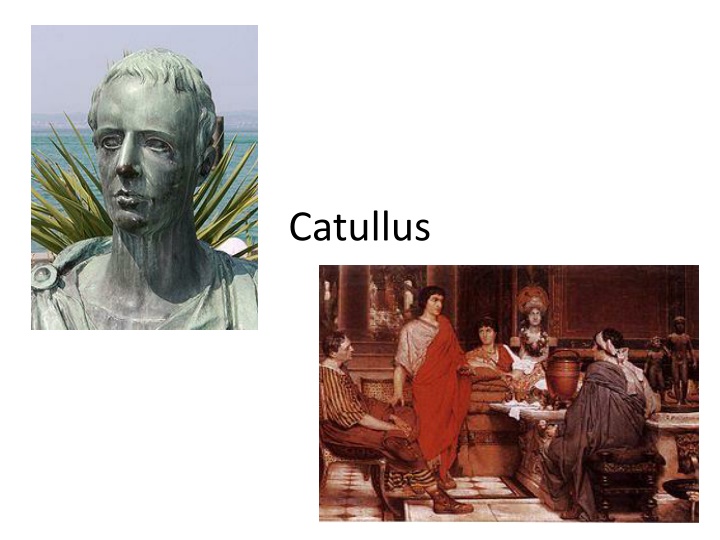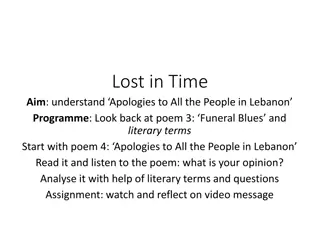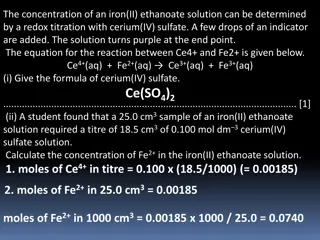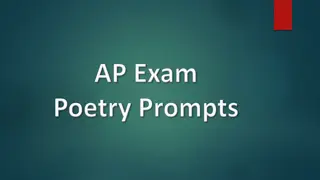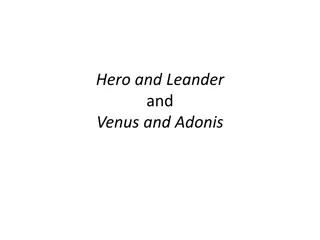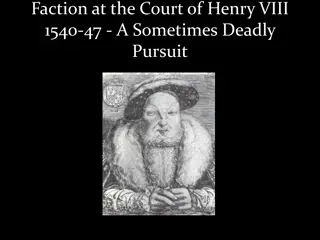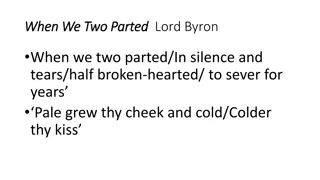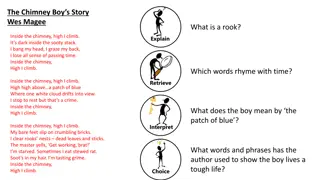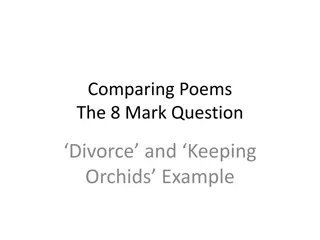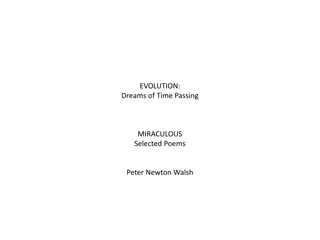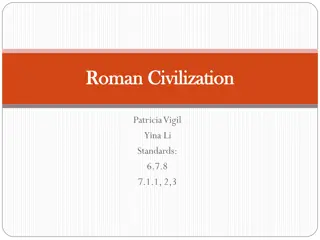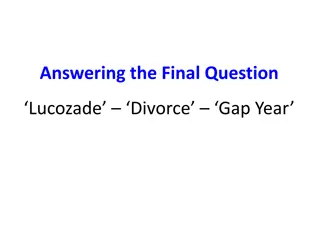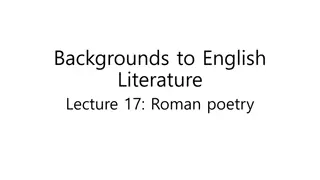Catullus' Poems VII and VIII Analysis
The poetic analysis of Catullus' poems VII and VIII focusing on themes of love, desire, and emotion. Discover the use of literary devices such as syncopation, anastrophe, and indirect statements. Dive into the nuances of Latin grammar with explanations of subjunctive verbs, infinitives, and imperatives. Uncover the beauty and complexity of Catullus' poetry through a linguistic and thematic lens.
Download Presentation

Please find below an Image/Link to download the presentation.
The content on the website is provided AS IS for your information and personal use only. It may not be sold, licensed, or shared on other websites without obtaining consent from the author.If you encounter any issues during the download, it is possible that the publisher has removed the file from their server.
You are allowed to download the files provided on this website for personal or commercial use, subject to the condition that they are used lawfully. All files are the property of their respective owners.
The content on the website is provided AS IS for your information and personal use only. It may not be sold, licensed, or shared on other websites without obtaining consent from the author.
E N D
Presentation Transcript
http://upload.wikimedia.org/wikipedia/commons/thumb/b/b2/Catull_Sirmione.jpg/220px-Catull_Sirmione.jpghttp://upload.wikimedia.org/wikipedia/commons/thumb/b/b2/Catull_Sirmione.jpg/220px-Catull_Sirmione.jpg Catullus http://upload.wikimedia.org/wikipedia/commons/thumb/5/51/Catullus_at_Lesbia%27s_by_Sir_Laurence_Alma_Tadema.jpg/300px-Catullus_at_Lesbia%27s_by_Sir_Laurence_Alma_Tadema.jpg
Catullus VII 1. Quaeris, quot mihi basiationes basiatio, basiationis (f) = mega kiss sint is pres subjunctive of sum quam here means as line 4 is understood as descriptive of harenae lasarpiciferis = in silphium bearing oraculum inter is an example of anastrophe, inversion of the natural word order quam in line 7 has the same meaning as in line 3 cum in line 7 means when line 8 is descriptive of sidera furtivus, -a, -um = secret vesanus, -a, -um = insane nec nec = neither nor possint is subjunctive of possum fascinare = to cast a spell 2. tuae, Lesbia, sint satis superque. 3. quam magnus numerus Libyssae harenae 4. lasarpiciferis iacet Cyrenis 5. oraclum Iovis inter aestuosi 6. et Batti veteris sacrum sepulcrum; 7. aut quam sidera multa, cum tacet nox, 8. furtivos hominum vident amores: 9. tam te basia multa basiare 10. vesano satis et super Catullo est, 11. quae nec pernumerare curiosi 12. possint nec mala fascinare lingua.
Catullus VIII Find an imperative. fulsere in line 8 is not an infinitive It is an example of a syncopated form. Sometimes in poetry, poets use abbreviated forms of certain endings. Why? metri causa = for the sake of the meter. Exanples of syncopation include: -erunt -ere -visti --sti -orum -um imperatives are constructed by: INFINITIVE -re (sing) INF -re + -te (pl) For 3rd Conjugation Verbs only, the final e turns into an i before adding -te There are some irregulars: facere fac ducere duc dicere dic ferre fer 1. 2. 3. 4. 5. 6. 7. 8. 9. 10. nec quae fugit sectare, nec miser vive, 11. sed obstinata mente perfer, obdura. Miser Catulle, desinas ineptire, et quod vides perisse perditum ducas. Fulsere quondam candidi tibi soles, cum ventitabas quo puella ducebat amata nobis quantum amabitur nulla. Ibi illa multa cum iocosa fiebant, quae tu volebas nec puella nolebat, fulsere vere candidi tibi soles. Nunc iam illa non vult: tu quoque impotens noli, Find an infinitive. quod vides perisse is an indirect statement. An indirect statement is introduced by a main verb which means thinking, feeling, saying, and sometimes seeing. The indirect statement describes what the person is thinking, feeling, saying, or seeing. This is how it s constructed: MAIN VERB (thinks/ feels/ says) NOUN IN THE ACCUSATIVE (that someone or something) SECONDARY VERB IN THE INFINITIVE (is doing something) There are three types of infinitives: Present infinitive (-are, ere, -ire) meaning the secondary action is happening AT THE SAME TIME as the primary action Past infinitive (3rd p.p. + isse) meaning the secondary action is happening BEFORE the primary action Future Infinitive (-urus esse) meaning the secondary action will happen AFTER the primary action -visse -sse desinas and ducas are present subjunctives ineptire = to be a fool quod vides perisse is an indirect statement Fulsere is syncopated form of fulserunt candidus, -a, -um = bright quondam = once ventito, ventitare = to come often quo = to where amata is perfect passive participle quantum = as much as cum in line 6 means when vere = truly noli = don t (to make a negative imperative, use noli + inf [sing] or nolite + inf [pl]) sectare = to follow mihi mi
Catullus VIII Continued 12. Vale puella, iam Catullus obdurat, 13. nec te requiret nec rogabit invitam. 14. At tu dolebis, cum rogaberis nulla. 15. Scelesta, vae te, quae tibi manet vita? 16. Quis nunc te adibit? cui videberis bella? 17. Quem nunc amabis? Cuius esse diceris? 18. Quem basiabis? Cui labella mordebis? 19. At tu, Catulle, destinatus obdura. doleo, dolere = to be sad rogaberis is future passive (r, ris, tur, mur, mini, ntur); notice how the bi- turns into be- because the Romans had a hard time saying -biris rogaberis therefore means you will be asked labellum, -i = little lip (diminutive) modeo, mordere = bite/ Find a future tense verb Regular Future Tense (will/ shall): 1st & 2nd Conjugation = INF -re + [bo, bis, bit, bimus, bitis, bunt] 3rd & 4th Conjugation = INF ere or ire + [am, es, et, emus, etis, ent] nibble cui is possessive dative in line 18
Catullus LXX N M F M F N N s nullus nulla nullum N s ipse ipsa ipsum 1. Nulli se dicit mulier mea nubere malle 2. quam mihi, non si se Iuppiter ipse petat. 3. dicit: sed mulier cupido quod dicit amanti, 4. in vento et rapida scribere oportet aqua. line 1 is an indirect statement nulli is dat after nubere malo, malle, malui = prefer quam can be used in a comparison meaning than ; the word that follows must be in the same case as what it s being compared to; this tends to be Nom, but not always, as in line 2; what is another way to show comparison? G s nullius nullius nullius G s ipsius ipsius ipsius D s nulli nulli nulli D s ipsi ipsi ipsi Ac s nullum nullam nullum Ac s ipsum ipsam ipsum Ab s nullo nulla nullo Ab s ipso ipsa ipsum N pl nulli nullae nulla N pl ipsi ipsae ipsa G pl nullorum nullarum nullorum G pl ipsorim ipsarum ipsorum D pl nullis nullis nullis D pl ipsis ipsis ipsis Ac pl nullos nullas nulla Ac pl ipsos ipsas ipsa What is the case of Nulli: in line 1? Why? Ab pl nullis nullis nullis Ab pl ipsis ipsis ipsis
Catullus LXXII nosse is syncopated novisse diligo, diligere, dilexi, dilectus = love tantus = only vulgus, -a, -um = common gener, generi = son-in-law impense = eagerly; -ius is comparative ending for adverb 1. 2. 3. 4. 5. 6. 7. 8. Dicebas quondam solum te nosse Catullum, Lesbia, nec prae me velle tenere Iouem. dilexi tum te non tantum ut vulgus amicam, sed pater ut gnatos diligit et generos. nunc te cognovi: quare etsi impensius uror, multo mi tamen es vilior et levior. qui potis est, inquis? quod amantem iniuria talis cogit amare magis, sed bene velle minus. uro, urere, usi = burn qui potis est = how is this able; qui has meaning of how here; potis is adjective talis, talis, tale = such cogo, cogere, coegi. coactus = force
Catullus LXXXV 1. Odi et amo. Quare id faciam, fortasse requiris. 2. nescio, sed fieri sentio et excrucior. faciam is subjuntive, not future; why? fio, fieri, factus sum = happen
Catullus CI veho, vehere, vexi, vectus = bear/ carry inferia, inferiae = offerings to the dead/ funeral rites donarem is imperfect subjunctive in a purpose clause munus, muneris (n) = gift/ tribute nequiquam = in vain adloquor, adloqui, adlocutus sum = speak to; adloquerer is present subjunctive in the purpose clause quandoquidem = since 1. 2. 3. 4. 5. 6. 7. 8. 9. 10. atque in perpetuum, frater, ave atque vale. Multas per gentes et multa per aequora vectus advenio has miseras, frater, ad inferias, ut te postremo donarem munere mortis et mutam nequiquam alloquerer cinerem. Quandoquidem fortuna mihi tete abstulit ipsum. Heu miser indigne frater adempte mihi, nunc tamen interea haec, prisco quae more parentum tradita sunt tristi munere ad inferias, accipe fraterno multum manantia fletu, adimo, adimere, ademi, ademptus = take away mihi in line 6 means from me haec in line 7 is the direct object of accipe in line 9 priscus, -a, -um = ancient tristi munere in line 8 is ablative in apposition as a sad gift mano, manare, manavi, mantus = soak fletus, fletus = weeping/ tears
